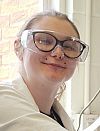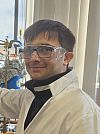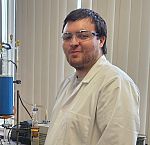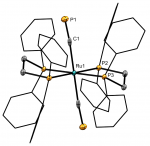Latest Group News
July 2025
|
We extend a, slighlty belated, warm welcome to Quinn Hutton, who joins us for a summer project. Quinn, one of your third year undergraduates, joins us having secured a very competitive Kroto-Walton JRA studentship, one of four awarded in memory of Prof. Sir Harry Kroto and Dr David Walton, as part of the Sussex Junior Research Associatea> scheme. Quinn's project will extend some of our work on through-conjugated cyaphide-alkynyl complexes, working toward phosphorus-doped molecular-wire mimics. |
 |
January 2025
|
We extend a warm welcome a new group member, Adam Carr. Adam joins us from the University of York (MSc Green Chemistry) to start his Ph.D. research. He will be working on a Leverhulme Trust funded project to develop the chemistry of our benzodiphosphaborolediide ligand (CEJ 2021), and expand on this novel motif to develop the broader ligand class. |
 |
July 2024
|
We still have a 3.5 year PhD studentship available in the group from September 2024; fully funded (UK students) on the Leverhulme Trust Project Grant "Heteroborolediides: A New Class of Donor-Acceptor Ligand". The project will build on our work with the benzodiphosphaborolediide (CEJ 2021) to expand and develop the synthetic route to access a range of related ligands and explore their coordination chemistry. Full details |
 |
|
We welcome Nathan to the group, whoi joins us for a summer project. Nathan, one of our second year undergraduates, joins us having secured a very competitive Kroto-Walton JRA studentships, one of four awarded in memory of Prof. Sir Harry Kroto and Dr David Walton, as part of the Sussex Junior Research Associate Scheme. Nathan's project will explore some of our cyaphide-derived chemistry, seeking to expand this toward previously inaccessible systems. |
 |
May 2024
|
Our latest paper is just accepted in Chem. Eur. J. and describes the first example of a monometallic bis(cyaphido) complex. Maddie estabilshed access to this novel compound from her 5-coordinate cyaphidic cation during her Ph.D.; Monte then picked up the project and obtained x-ray data. This is the first time two cyaphide ligand have been bound to a single metal centre, representing a significant step in establishing the versatility of the ligand in line with its carbonyl and cyanide analogues. Our computational studies, in collaboration with our colleague John Turner, also show that in addition to being a good σ-donor and π-acceptor, cyaphide also has a degree of π-donor character beyond that of cyanide. The work has been highlighted in ChemistryViews Magazine. |
 |
March 2024
|
PhD Studentship Available We have a 3.5 year PhD studentship available in the group from September 2024; fully funded (UK students) on the Leverhulme Trust Project Grant "Heteroborolediides: A New Class of Donor-Acceptor Ligand". The project will build on our work with the benzodiphosphaborolediide (CEJ 2021) to expand and develop the synthetic route to access a range of related ligands and explore their coordination chemistry. Full details |
 |
October 2023
|
We welcome two new members to the group. Ben joins us from the University of Edinburgh (M.Sc. Cowley group) to start his Ph.D. research. His project will build on some of our work with conjugated organometallics featuring low-coordinate phosphorus, expanding the concept to include other main group elements. Euritz joins us for her MChem project, having returned from a year in industry. Her project will be focussed on developig new ligand/metal scaffolds to stabilise some of our novel phosphacarbon ligands. A warm welcome to them both. |
|
April 2023
|
Monte and Ian attended the 2023 Dalton meeting in Warwick, where Monte presented a poster of some of our recent work. It was also good to catch up with some past (and future) Crossley lab members |
|
- News Archive 2022
-
October 2022
We welcome new group member Rachel Brown, who joins us for her MChem project. Rachel will be working on the coordination chemistry of our recently reported benzodiphosphaborolediide ligand and the synthesis of analogues and derivatives.

August 2022
Ian was thrilled to be invited to present our work on phosphaorganometallic chemistry at a special symposium of the ACS Fall 2022 meeting (August 21st - 25th), entitled 'International Crossroads in Organometallic and Group V Chemistry'. The symposium included some of the most eminent group 15 chemists in the world, speaking about a wide range of Chemistry around the organometallic and group 15 interface.
July 2022
Maddie, Kyle and the MChem class of 2021 finally got to graduate on July 11th. Not all could make it in person but those who did had a fantastic day. Congratulations to all and best wishes with current and future endeavours.
June 2022
We welcome two new starters to the group! Dr Monte Helm joins us from Missouri for a sabbatical visit, while Theo Webb joins us for a summer project as part of our MChem with Summer Research Placement degree.
- News Archive 2021
-
October 2021
Our latest paper, published in Chem. Eur. J., describes the first diphosphaborolediide - a previously missing member of the 'hetero-Cp' family of ligands. Kyle and Eli developed a simple one-pot synthesis from 1,2-bis(phosphino)benzene, following a sequential lithiation approach. Isolated as the dilithium salt, as both thf and tmeda solvates, the diphosphaborolediide was shown to possess aromaticity by NICS calculations and its coordination to zero-valent molybdenum. This work, which was a collaboration with our colleague Prof. John Nixon, was highlighted in ChemistryViews Magazine and is currently free to read.

July 2021
Congratulations Dr Kyle Pearce
Congratulations to Kyle, who passed his Ph.D. viva on July 26th 2021. His thesis, entitled "Electronically distinctive cyclic phosphanes: synthesis and structural modifications toward the control of chemical and electronic properties" details a range of new cyclic scaffolds incorporating the diketophosphanyl moiety and the study of their properteis, as detailed in recent publications (Dalton 2020, JOC 2020). More fundamental studies of phosphaalkenes and a phosphaborolide chemistry are also described, which will be the subject of an imminent publications. We wish Kyle well in his current post doc with, Prof. Mike Hill at Bath, and his future endeavours, and look forward to ebing able to celebrate in person in the not too distant future.

Ian and Kyle both attended the 23rd international conference on phosphorus chemistry, hosted in Czestochowa, Poland. The meeting was held virtually, with Ian giving an invited lecture on our recent work with cyaphides and acylphosphane ligands, while Kyle presented a poster discussing his recent work on phosphaborolide chemistry (watch this space).

February 2021
Congratulations Dr Madeleine Levis
Congratulations to Maddie, who passed her Ph.D. viva on February 24th 2021. Her thesis, entitled "Synthesis and Reactivity of Transition Metal Cyaphide Complexes" details the synthesis and fundamental study of a wide range of novel cyaphide-containing complexes, including our recently published trans-methyl and trans-halo systems, and the 5-coordinate [Ru(dppe)2(CP)]+, which has opened the door to an extensive family of complexes (watch this space!).
We wish Maddie well for the future and look forward to being able to celebrate in person some day soon.
- News Archive 2020
-
October 2020
Our latest paper, published in J. Org. Chem., represents a long over-due return to our diphosphametacyclophane chemistry. Kyle has been developing this motif - first discovered by Amy in 2012, and known to the group as 'insects' - to include substituent variation in the aromatic scaffold and at phosphorus. We thus describe a 'colony of insects' and explore them using spectroscopy, electrochemistry and DFT, to gain an understanding of the electronic character imparted by the two diketophosphanyl substituents. This paper is an invited contribution to the coming special issue of J. Org. Chem. "The New Golden Age of Organophosphorus Chemmistry".

We welcome to the group our 20-21 MChem students, Matt, Fruzsina and Alex. Though not yet in the lab, Matt will be working with the cyaphides, while Fruzsina extends our work on electronically novel phosphacycles. Alex will be working on a joint project with Prof. John Spencer's group. We look forward to getting them all started in the coming weeks.

September 2020
Congratulations to Kyle for winning the prize for the best presentation at the Departmental 2020 PhD colloquium. Kyle presented sone of his work on novel and electronically distinctive phosphacycles including the novel phosphaalkyldiones that we published earlier this year (Dalton Trans. April) and a range of diphosphametacyclophanes that are the subject of a coming publicaton (watch this space).

April 2020
Our latest paper in Dalton Trans. describes a new class of cyclic phosphane based on the diketophosphanyl (-C(O)PR(CO)-) moiety. The work, from Kyle and our 2019 summer (JRA) student Vlad, demonstrates synthesis of a series of 6- and 7-member rings, which exhibit conformational fluxionality in solution. Though sensitive to moisture, these molecules appear resistant to controlled oxidation, but do ligate metals, albeit as relatively weak s-donors.

- News Archive 2019
-
October 2019
Controlled Reactivity in Cyaphide Complexes
Our latest cyaphide paper has been published in Inorganic Chemistry. This work - from Maddie - achieves for the first time controlled metathesis and ligand exchange within a cyaphdie-complex, with retention of the cyaphide ligand, intact. This finally gives us access to trans-halo cyaphide complexes that can be engaged in further reaction with nucleophiles, and also undergo halide abstraction to give an unprecedented 5-coordinate cyaphide complex. This really opens the door to a wider range of complexes of this intriguing ligand, including some unexpected reactivity that we will be describing shortly... watch this space!

This month we welcome to the group Elinor Canham and Harry Jackson, who both join us for their final year MChem projects. Eli joins our phosphorus ligand team and will be developing a nove hybrid P/B system and exploring its chemistry. Meanwhile Harry joins our cyapide team, seeking new synthetic routes to these intriguing coordination complexes.
September 2019
Maddie and Kyle represented the group at the 2019 Dalton Young Members Event, held in Cardiff on September 5th and 6th. Maddie gave a talk on her recent advances in the sythesis and chemistry of transition metal cyaphide complexes, while Kyle presented a poster on his phosphorus macrocycle work.
July 2019
This month the group welcomes Vladimir Simenok, who joins us for a summer project. Vlad, a second year Sussex undergraduate, joins us having secured a bursary from the - very competitive - Suseex Junor Research Associate (JRA) Scheme. This funds Vlad to spend 8 weeks of his summer working in our laboratory, focussed on developing the chemistry of of our diphosphametacyclophane ligands (see for example Chem. Commun. 2012).

April 2019
Substituent Effects in trans Cyaphide-Alkynyl Complexes
Our latest cyaphide paper has been published in Dalton Transactons, invited as part of the web-themed collection "Challenges in Organometallic & Coordination Chemistry", celebrating our colleague Geoff Cloke's 65th birthday. In this work we describe an extended and in-depth study of trans cyaphide-alkynyl complexes, elaborating on the interaction between the remote alkynyl terminus and the cyaphide moiety, as determined spectroscopic and electrochemical studies.

- News Archive 2018
-
December 2018
Sam represented the group at the Phosphorus, Boron and Silicon Conference (PBSi), held in Barcelona from December 10th - 12th 2018. Her talk discussed in detail the results summarised in her prize-winning poster and some more recent directions her work has taken. Her attendance at this meeting was enabled by the RSC Travel Bursary awarded as her prize for the Sir Geoffrey Wilkinson Dalton Poster Competition.

November 2018
Congratulations Dr Matthew Leech
Congratulations to Matt, who passed his Ph.D. viva on November 20th 2018. His thesis, entitled "Transition Metal Cyaphides: Synthesis, Reactivity and Chemistry Chemistry" details the synthesis and fundamental study of a range of transition metal cyaphide complexes, including the recently published bimetallic systems (Dalton Trans., 2018, 474428). Further developments of the work will be the subject of several coming publications - watch this space!
We wish Matt well for the future.
September 2018
This month we welcome back Josh Tyrrell to the group. Josh previously spent a summer in our lab (2017) on an RSC Summmer Research Bursary, focussed on the coordination chemistry of our diphosphametacyclophanes. Following a sandwich year at Uppsala University (Sweeden) he now rejoins us for his final year M.Chem. resarch project as part of our cyaphide team, working to further develop the organometallic chemistry of this, still very rare, ligand.

July 2018
Immediately following the ICPC meeting, Ian was joined in Florence by Sam and Maddie for the 28th International Conference on Organometallic Chemistry, held from July 15th – 20th. Ian gave one of the opening oral contributions of the conferences, which was followed on Thursday 19th by posters from Sam and Maddie providing more details of our most recent cyaphide work.
The PI attended the 22nd International Conference on Phosphorus Chemistry, held in Budapest from July 8th – 13th. Ian spoke about the groups recent advances in our studies of organometallic cyaphide complexes, including our elucidation of unprecedented reactivity, and also summarised other work within the group.
April 2018
Sam Takes the Prize @ Dalton 2018
The Dalton 2018 meeting included The RSC Sir Geoffrey Wilkinson Dalton Poster Competition, an annual event supported by the Geoffrey Wilkinson foundation, which aims to celebrate the breadth and strength of inorganic chemistry as presented by talented young researchers early in their career.
We are extremely pleased to announce that from a very strong field, the post-doctoral category of the competition was won by our very own Dr Samantha Furfari (pictured with Prof. Emma Raven, Dalton Division President) for her poster 'Investigating the substituents effects of trans alkynyl-cyaphide complexes'. Sam's prize includes an RSC travel bursary to facilitate her attendance at a conference of her choice. Read the University news item here.

The group and our work were well represented at Dalton 2018 - the fourth Dalton Division joint interest group meeting - held at the University of Warwick from 3rd - 5th April. Matt Leech gave a well-received talk summarising several aspects of his work on through-conjugated cyaphide complexes and some more recent studies centred on reactivity and more varied supporting scaffolds. Other aspects of our work were presented as posters by Kyle (cyclophane chemistry), Maddie (novel cyaphide complexes) and Sam (substituent effects within alkynyl-cyaphide complexes), whose poster won a prize.
February 2018
Through-conjugated cyaphides in Dalton
Some of our latest work on organometallic cyaphide complexes has been published on-line by Dalton Transactons. Our communication describes work undertaken by Matt Leech on the synthesis of a bimetallic complex featuring two terminal cyaphide ligands, which exhibit through-conjugation. This is the first time two discrete phosphaalkyne-like moieties have been incorporated within a single through-conjugated scaffold. The complex is studied by combination of theoretical and experimental methods, which includes the first investigation of the influenc of cyaphide upon the redox properties of an organometallic scaffold.

- News Archive 2017
-
November 2017
Sam Addresses the Stokes Society, Cambridge
Following from her session at Brighton's first Soapbox Science event (July News), Sam was invited by the Stokes Society of Pembrloke College, Cambridge to give a presentation to undergraduate students (November 15th). The society hosts speakers from across the scientific disciplines, bringing cutting edge science to a broad undergraduate audience. Sam's talk "Spectroscopic Fun with Carbenes and Phosphines" discussed a range of work she has undertaken focussed on synthesising and using these versatile ligands in the areas of coordination and organometallic chemistry..

September 2017
This month we welcome to the group Kyle Pearce, and welcome back Jennifer Smart. Kyle joins us from the University of Kent (M.Chem. Chemistry 2017) to begin his Ph.D. research. His project will build upon our work with the diphosphametacyclophane motif (Chem. Commun. 2012), focussing on adapting and expanding the synthetic protocol to access functionalised dericatives, and exploring theic coordination chemistry. Jennifer, who previously worked with us (2016) as part of the University of Sussex JRA scheme, returns for her M.Chem. research project, which will build on our very recent discovery of a facile route to novel halohydro-organophosphine complexes (Organometallics 2017).


Ian represented both the group, and chemistry department, as an invited speaker at this year's Sussex Life Sciences Symposium, held on September 15th. The annual event features presentations by PIs from across the school, highlighting the variety of research being undertaken within the different subject groups. This year's symposium also included plenary lectures from two Nobel laureates, Prof. Dr Christiane Nüsslein-Volhard and president of the Royal Soceiety, Prof Sir Venki Ramakrishnan.

Dalton Young Members' Event 2017
Matt represented the group at this year's DYME, held in Bath on September 7th - 8th. Matt's talk entitled 'Cyaphide and Acetylide: The effects of isolobal fragment exchange' described some of his recent studies concerning the differences in electronic and structural features between the cyaphide, acetylide and cyanide homologues of some ruthenium complexes.
July 2017
Sam Furfari brought coordination chemistry to the public on Saturday July 29th, as part of Brighton's first Soapbox Science event; Sam was one of three speakers from the School of Life Sciences taking part, alongside other contributors from the university and across the region. Braving the rain on Brighton seafront, Sam introduced the subject, its breadth and importance to locals and tourists, and inspired the younger generation with a colourful demosntration.
Soapbox Science is a world-wide outreach platform promoting women scientists and engineers working in STEMM, and some of the leading research they conduct.

The group had several reasons for celebration at this year's summer graduation, which was held on the afternoon of Monday July 17th. Vicki (now Dr Victoria Greenacre) received her Ph.D. for her work on ambiphilic phosphorus-based ligands and complexes, while Joe Paterson received his MChem(hons) degree, the research component of which was carried out in our lab. Additionally, lab alumnus Melvyn Ansell (MChem 2013) was also graduating with a Ph.D., obtained for his work on N-heterocyclic carbene complexes in catalysis, carried out under the supervision of Dr Oscar Navarro and Prof. John Spencer.


June 2017
Josh Tyrrell RSC Summer Bursary
We welcome Josh Tyrrell to the group as an RSC funded summer researcher. Josh won a very competitive RSC Summer Bursary to undertake work in our laboratory focussed on developing the coordination chemistry of our diphosphametacyclophane ligand (see Chem. Commun. 2012), and investigating the thermal stability of both the ligand and its complexes.

- News Archive 2016
-
December 2016
Congratulations Dr Victoria Greenacre
Congratulations to Vicki, who passed her Ph.D. viva on December 6th 2016. Her thesis, entitled "Synthesis and Chemistry of Novel Ambiphilic Phosphorus Based Ligands and Complexes" details the synthesis of a range of phosphane-boranes and their complexes (Eur. J. Inorg. Chem., 2014, 5053). It also describes extended investigations into the chemistry of phosphaalkenyl and η2-phosphaalkene complexes of ruthenium (Organometallics 2015, 34, 2533; Inorganics 2016 in press), building on previous work from the group. Vicki will graduate at the Summer ceremony (July 2017) and now leaves the Crossley lab for a post-doc at Southampton in the group of Prof. Gill Reid. We wish her every success in her new position, and for the future.

September 2016
The group welcomes two new members this month, Madeleine Levis and Joe Paterson.
Maddie, joins us for her Ph.D. studies (EPSRC) in the area of Cyaphide chemistry. She is a recent graduate of Newcastle University (MChem. Chemistry) and as part of her degree spent a year in the research lab of Rory Waterman (Vermont).
Joe is currently in the final year of his MChem degree here at Sussex, and joins us as a project student. He will be working in the area of phosphine-borane ligand design and synthesis.


July 2016
The PI was able to attend the 27th International Conference on Organometallic Chemistry, held in Melbourne, Australia. Ian presented the group's recent work on Cyaphide compounds, both at the conference and a series of invited seminars (RMIT, ANU, Macquarie) alongside some of our other work on aroylphosphanes (Saunders) and P-ruthenaphosphaalkenyls (Greenacre, Trathen).

April 2016
Welcome to Dr Samantha Furfari
We welcome Dr Samantha Furfari to the group as Research Fellow. Sam will be working on our recent EPSRC funded project concerning the development of cyaphide complexes and other linearly conjugated phosphacarbons. She joins us from the University of New South Wales (UNSW) where she most recently undertook post-doctoral research in the group of Prof. Les Field, following her PhD with Assoc. Prof. Marcus Cole.

March 2016
The group recently attended Dalton 2016 - the third Dalton Division joint interest group meeting - at Warwick from 29th - 31st March. Our work was presented by Vicki, who gave an oral presentation on her work with metallaphosphaalkenyl complexes, and Matt, whose poster described some of our recent (soon to be published) work with cyaphide complexes.


- News Archive 2015
-
November 2015
EPSRC support cyaphide development
The Crossley lab has received a grant from the Engineering and Physical Sciences Research Council (EPSRC) to support our continuing work on the development of linearly conjugated complexes featuring the cyaphide ligand, building on our recent report of the first such compounds (Dalton Trans., 2014, 43, 9004). The project will further develop synthetic methodology and explore and optimise electronic and redox properties of a wide range of these, and related, complexes.

April 2015
Southern Regional Dalton Meeting
The group was well represented at the recent Southern Regional Dalton meeting of the RSC, held at Sussex April 20th - 21st. Vicki presented a poster detailing our recent work on Ruthenaphosphaalkenyl complexes (Organometallics 2013, 32, 2501 & 2015 in press), while Matt's poster outlined his recent work with Cyaphide complexes, building on our 2014 communication (Dalton Trans., 2014, 43, 9004). The PI's (Ian) presentation gave a broader discussion of these and related works.
- News Archive 2014
-
December 2014
Congratulations Dr Nicola Trathen
Congratulations to Nikki, who passed her Ph.D. viva on December 11th 2014. Her thesis, entitled "The Organometallic Chemistry of Conjugated Phosphacarbon Compounds" details the synthesis of a range of ruthenium phosphaalkenyl (Organometallics, 2013, 32, 2501) and η2-phosphaalkene complexes. It also describes the first examples of conjugated Cyaphide-alknyl complexes, which were featured the cover of Dalton Transactions. Nikki will graduate at the Summer ceremony (July 2015) and has now left the Crossley lab to become a publishing editor with the RSC. We wish her every success for the future.

August 2014
Congratulations Dr Amy Saunders
Congratulations to Amy, who passed her Ph.D. viva on August 21st 2014. Her thesis, entitled "The development and chemistry of novel phosphacarbons and their derivatives" details the synthesis of a range of phosphomide-type ligands, including the first diphospha-metacyclophane (Chem. Commun. 2012, 48, 5766), and more unusual propargyl phosphanes. It also describes the synthesis, and subsequent reactivity of a range of extremely reactive phosphaalkenes. Amy will graduate at the Winter ceremony (January 2015) and has now left the Crossley lab to become a deputy editor with Pro Global Media. We wish her every success for the future.

July 2014
Our work on the cover of Dalton
Our recent paper concerning conjugated cyaphide-alkynyl complexes of ruthenium was recently featured on the inside cover of Dalton Transactions (28 June 2014). This paper describes work undertaken by Nikki Trathen and Matt Leech on the synthesis of ruthenium(II) alkynyl complexes that incorporate the elusive cyaphide ligand trans to the alkynyl. This is only the second report of terminal cyaphide complexes (only one existed previously) and the first time the electronic structure of such compounds has been studied. The cover image, showing the molecular structure of the complexes, was designed by Vicki Greenacre, from the X-ray structure she obtained.

Vicki Greenacre recently represented the group at the 3rd RSC Younger Members Symposium (Birmingham, June 24th) and received an award for her poster presentation. The prize, awarded by the EuCheMS European Young Chemists' Network (EYCN), recognised her 'distinctive and innovative presentation of research work'.
Vicki's poster detailed part of her recent Ph.D. work, focussed on the synthesis, characterisation and study of some novel, singly-bridged phosphine-borane ligands and their coordination complexes with the platium group metals. This work has since been published in the European Journal of Inorganic Chemistry.




























